

Tao Te Ching
Search Sages
Enter all or part of an sage's name or biography in the fields below, then press tab or enter to filter the list of Authors. Click the headings Name or Biography to sort by that column. Diacritics are ignored when searching.
Click on the author's name to go to their page.
| Author Name | Biography |
|---|---|
| Empress Suiko | 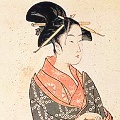 Empress Suiko Empress SuikoEmperor’s daughter, Buddhist nun, first and only confirmed Japanese Empress Regnant of Japan; Suiko’s many achievements include adopting a more useful calendar cycle, the 17-article constitution (written by Shotoku), and the official recognition of Buddhism by the issuance of the Flourishing Three Treasures Edict in 594. She was one of the first Buddhist monarchs in Japan, sponsored Buddhist temples and monasteries, and firmly established Buddhism in Japan. She orchestrated China’s first diplomatic recognition of Japan and close cultural contact with both China and Korea. |
| Denys de Rougemont | 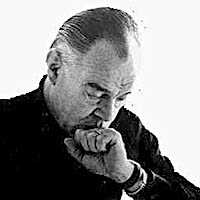 Denys de Rougemont Denys de RougemontNon-conformist leader, influential cultural theorist Cultural theorist, prolific writer of 32+ books, and Swiss defender against Nazi propaganda; de Rougemont was an influential non-conformist of the 1930's, opponent of his era's totalitarian movements, and advocate for European federalism. His ground-breaking book, Love in the Western World, questioned and criticized Western Civilization's fascination with romantic, unrequited love. A paramour of Saint-Exupéry's Salvadoran wife, Consuelo ("The Rose"), he modeled for a Little Prince painting, wrote a Saint-Exupéry biography, and later helped Consuelo write her own autobiography. |
| Hua Mulan |  Hua Mulan Hua MulanConsidered by some historical, by others a legendary figure; either way, through much of modern Chinese history Mulan inspired women, poetry, essays, operas and paintings. To save her father, she pretended to be a man so she could take his mandatory place in the army fighting against the Mongols invading China. Since the earlier, matriarchal time of Fuxi and Nü Wa, this was one of the first examples of Chinese gender equality. During her 12 years in the army she turned down numerous distinctions, titles, and rewards for her successes and chose instead a return to a quite life at home. |
| Robin Kornman | 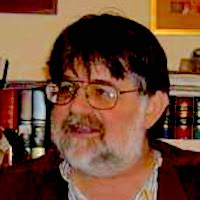 Robin Kornman Robin KornmanScholar, translator, Bodhisattva Co-director of the first retreat center in the usa that Chögyam Trungpa Rinpoche set up in 1970 (Tail of the Tiger, name later changed by HH Karmpapa XVI to Karmê Chöling), co-founder Nalanda Translation Group, university professor, and one of the world's experts on the Gesar of Ling literature; Kornman began translation work on this famous Tibet oral epic in the 1980's and continued this focus until his untimely death in 2007 (because of asbestos exposure caused cancer when he was young). He devoted his life to helping others by teaching, challenging, and humorous but deeply insightful commentary. |
| Tim Riley | 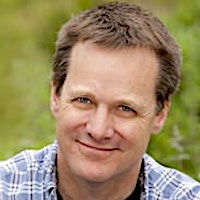 Tim Riley Tim RileyClassical pianist, digital journalist, and music critic; Riley writes for NPR, New York Times, Washington post, and many online news sites. He received a Best Book Review Award and a Best Nonfiction Award for his biography of John Lenno |
| Catrapa | 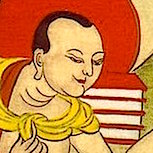 Catrapa CatrapaMahasiddha #23 Catrapa while begging always carried a small dictionary that attracted a wise teacher who asked him about the book and then his life. This led to teachings and a practice of dissolving all concepts, prejudice, negative and moral conditioning, and a blending of action with perception into a deep, non-dual awareness of each everyday experience in life. Instead of teaching morals, ethics, and discipline; he exemplified and taught the crazy wisdom of wu wei, enlightened spontaneity based on direct, unfiltered realization. Mahasiddha #2 |
| Goenka | 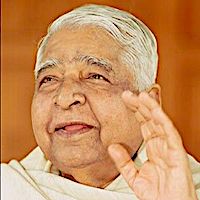 Goenka Goenka"The Man who Taught the World to Meditate" An Indian businessman who by chance met a spiritual teacher and set out on a spiritual path, Goenka taught meditation techniques previously reserved for monasteries to average people. He established centers all over the world and trained an estimated 1300 teachers. His courses emphasized a scientific, experiential, non-sectarian approach to meditation and over 120,000 people each year attended. Western students who set off on their own and became influential in the West include Jack Kornfield, Ram Dass, Jon Kabat-Zinn, Joseph Goldstein, and Sharon Salzberg. |
| Aeschylus | 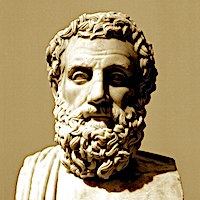 Aeschylus AeschylusThe Father of Tragedy Although Aeschylus was the first to present plays as trilogies, the initiator of many theatrical innovations, and the “father of tragedy;” his Greek epitaph didn’t mention his plays, only his military roles. Although not fully acknowledged in ancient Greece, his influence has seeped through history and into the present as an inspiration for Wagner, Milton, the Romantics, Eugene O’Neill, and Robert F. Kennedy who claimed him as his favorite poet who he quoted in a speech to African Americans after Martin Luther King’s assassination. This same quote—“to tame the savageness of man and make gentle the life of this world”— became inscribed on Kennedy’s memorial after his own assassination. Aeschylus’ costumes and performances were so vivid that they were said to cause children to faint, men to urinate in their robes, and pregnant women to go into labo |
| Huating Decheng | 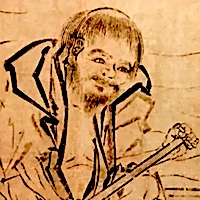 Huating Decheng Huating DechengAfter intense study with Chan Master Yaoshan Weiyan, Decheng moved to Hua Ting and lived on a small boat. He semi-anonymously stayed in the background and passed as a very ordinary person. As an occupation, he took people across a river while—with discrete subtlety—teaching them his Chan Buddhist understanding. In a famous story, he triggered a student's enlightenment by pushing him off the boat into the river. After the students realization, Dechenbg told him not to think about him anymore and fell off the boat into the water liberating the student from the golden chains of hero-worshipping delusion. |
| Ban Ki-moon | 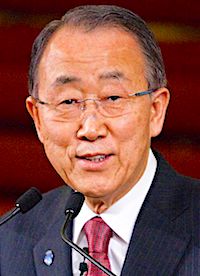 Ban Ki-moon Ban Ki-moon8th UN Secretary-General 8th Secretary-General of the United Nations, influential South Korean diplomat |
| Sun Qifeng | 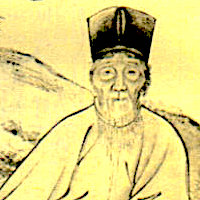 Sun Qifeng Sun Qifeng孫奇逢 (1583–1675) |
| David Loy | 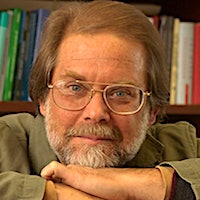 David Loy David LoyZen teacher, philosopher, and ecological activist; David Loy studied with Yamada-roshi and Robert Aitken-roshi, completed a formal koan practice in 1988, and taught at Singapore University, Bunkyo University in Japan, and Xavier University in Ohio. With a focus on encouraging individual spiritual practice to extend to and help solve social and ecological problems, he lectures internationally, teaches workshops, and leads meditation retreats. |
| John Stevens | 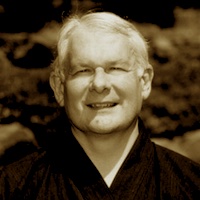 John Stevens John StevensZen scholar, Aikido master, and author of many books on Eastern philosophy, John Stevens came up with his own Aikido system which he teaches all over the world. |
| Su Shi | 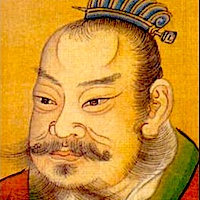 Su Shi Su Shi"pre-eminent personality of 11th century China" Writer, statesman, poet, painter, calligrapher, pharmacologist, and important political figure; Su Shi wrote some of his time's most well-known poems and prose as well as essays on topics from travel to the iron industry. An exceptional and highly honored scholar, while serving in the Hangzhou government, he constructed the famous pedestrian causeway across West Lake. His poems got him into political trouble leading to two long exiles and imprisonment; but also, they brought him a fame that spread to many other countries and continues today. His poems on Buddhist topics became an important influence on Dōgen, founder of the Zen Sōtō school. |
| Willa Cather | 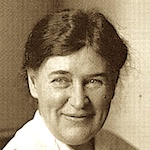 Willa Cather Willa CatherModern day Lao Tzu Wonderful novelist with a flare for evoking a deep appreciation for nature and the natural world, Willa Cather championed the values of self-sufficiency, independence, and harmony with nature. Nostalgic for the time when most people lived on farms, she used “the rising and setting of the sun” as a major theme and honored the struggle of exiled immigrants. Infusing meaningfulness and sacred outlook into simple, daily tasks she unknowingly continued the Zen spirit and understanding Lao Tzu wrote about so much longer before. |
| Aldous Huxley | 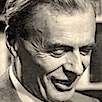 Aldous Huxley Aldous HuxleyWith deep insight and keen intelligence, Aldous Huxley for decades using almost every form of media to provide a penetrating commentary on contemporary civilization. Described as “the prophet of the 20th century,” he was nominated for the Nobel Prize in Literature 7 times. He brought into spotlight a vivid image of both the unconscious dark and potential brightness of our evolving technology, social, and political forms animating the dangers of consumption, conformity, technology dependence, indulgence, and pleasure-seeking as well as the potential of the perennial philosophy, finding deep meaning, understanding the sense and not just the words, experiencing the sacredness of each moment. |
| Barack Obama | 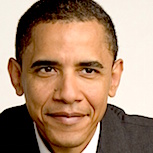 Barack Obama Barack ObamaWinner of honors ranging from the Grammy Awards to the Nobel Peace Prize; Obama is the first African American US President, the first sitting president to visit Hiroshima, and first to address the African Union. In spite of single-minded and almost exclusive focus on opposing him by House and Senate Republicans, his accomplishments rival almost any American president. Beginning with one of the most dire financial crises in US history; he turned the economy around, greatly improved foreign relations, passed the Affordable Care Act, killed Osama bin Laden, reigned in Wall Street, restored relations with Cuba and made progress on fighting climate change, prejudice, workplace abuse, and gun control. |
| Jiǎndí | 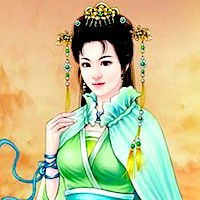 Jiǎndí Jiǎndí“The emperor 's emperor,” patron of merchants Wife of Yellow Emperor descendent Ku, mother of Qi, the Shang dynasty pre-founder; Jiandi headlines Chinese myths as well as historical accounts. In a myth, she miraculously becomes pregnant after swallowing a bird’s egg which leads to the birth of Qi and helps legitimize the founding of the Shang dynasty. She studied astronomy, good government, and influenced rule based on reason and creating more benefit for others. Described as “the emperor 's emperor,” she became a patron to merchants and her symbol was worn by businessmen for over 600 years. |
| E. F. Schumacher |  E. F. Schumacher E. F. SchumacherThe “People's Economist” While working in Burma during the mid ‘50s, Schumacher developed a set of principles he called “buddhist economics” — emphasizing the idea that people need good work for proper human development. Traveling through many Third World countries, he helped governments create self-reliant economies based on local resources and needs. A pioneer and instigator in creating a philosophy of “appropriate technology,” and known as the “People's Economist,” his economic theory based on wisdom instead of only materialism, became one of the most serious alternatives to the dominant economic theories based on Adam Smith and John Maynard Keynes. |
| B.R. Ambedkar | 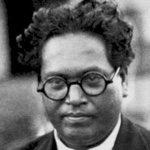 B.R. Ambedkar B.R. AmbedkarWhile Gandhi unjustly holds international fame and respect; Ambedkar remains almost unknown outside India. Unlike Gandhi who supported the caste system and held deeply racist and anti-feminine views, Ambedkar campaigned for the Dalts (Untouchables), the rights of women, and labor. Independent India's first law minister, main writer of the first Constitution, and considered by many a true Bodhisattva, he criticized Hinduism as being the foundation of the caste system and began a Buddhist revival. When he formally became a Buddhist in 1956, 500,000 at once followed in his footsteps. In 2012 almost 20 million people voted him the “Greatest Indian.” |